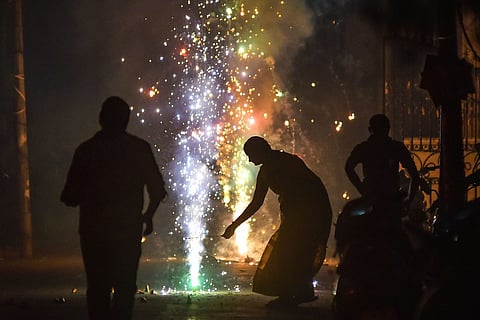

The Air Quality Index (AQI) observations, beginning on Deepavali day (Thursday, November 4) and ending the following morning, indicated that the air quality status in Chennai is very poor, the state government said on Friday. There was also a substantial increase in pollutants in the metropolis when compared to the previous year, the Tamil Nadu Pollution Control Board (PCB) said. The AQI observed from 6 AM on November 4 to 6.00 AM the following day, the "average value of AQI in Chennai city ranges between 342 to 385 and the Air quality status is very poor," an official release said. "The Air Quality Index was found to be very poor in all the monitoring stations in Chennai city," it added.
This could be due to very high relative humidity and low wind speed on Thursday, which attributes to high value in AQI, the PCB said. Deepavali was celebrated on November 4 this year and the Supreme Court had allowed the bursting of firecrackers for two hours, from 6 AM to 7 AM and from 7 PM to 8 PM.
In 2020, the AQI values in Chennai ranged between 59 and 107, which showed pollution on a moderate scale. As per AQI norms, 0-50 is good, 51-100 satisfactory, 101-200 moderately polluted, 201-300 poor, 301-400 very poor and beyond 400 is severe.
"The considerable increase in air pollution level and AQI values are mainly due to high relative humidity (90% and above) and the low wind speed and heavy bursting of crackers during the permitted time," the release said.
The Ambient Air Quality (AAQ) survey reveals that there is "substantial increase in the values of PM 10 and PM 2.5 parameters" in the five monitoring stations in Chennai city when compared to 2020.
The Particulate Matter (PM) PM 10 values ranged from 187 to 283 ug/m3 (the concentration of an air pollutant in micrograms per cubic meter of air) on Deepavali this year, as against the prescribed standard of 100 ug/m3. The PM 2.5 results ranged from 175 to 257 microgram/m3 during Deepavali day as against the prescribed norm of 60 ug/m3.
The levels of SO2 and NO2 gaseous pollutants were, however, found to be well within the prescribed standard of 80 ug/m3.
On ambient noise level, the PCB said the values ranged from 69 to 79 dB(A) (Decibel, the A scale to measure sound levels) during Deepavali day. In 2020, the dB(A) values were between 71 and 78 in the metropolis. The noise level standard is 55-45 dB(A) for residential and 65-55 dB(A) for commercial areas.